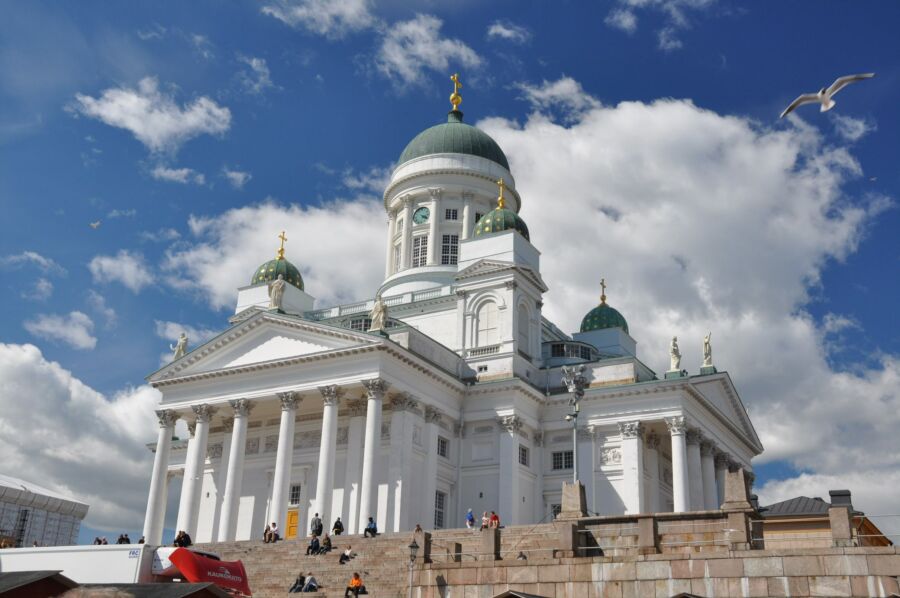The far fringes of Europe are rich with vivid memories. I was planning a trip back to Helsinki this summer. While that trip will have to wait, I’m enjoying reliving some Finnish memories.
Even though we’re not visiting Europe right now, I believe a daily dose of travel dreaming can be good medicine. I just published a collection of my favorite stories from a lifetime of European travels. My new book is called “For the Love of Europe” — and this story is just one of its 100 travel tales.

There’s a definite energy on the streets of Helsinki tonight. My friend Hanne explains, “We call Wednesday our ‘little Friday.’”
People are filling up the city’s main boulevard, named Boulevardi. (It was given that grandiose title 200 years ago, when the concept of a grand boulevard in Helsinki, then Europe’s newest capital, was somewhere between wishful thinking and absurdity. But the name stuck.)
There are so many people that I wonder if it’s some kind of demonstration. Then I see their robes and sheets of music and realize that these are choral groups, each represented by a placard. From all corners of the country, some 800 singers converge on the massive steps of the Lutheran Cathedral, overlooking the Neoclassical Senate Square. Crowds gather, enthusiastic to hear this annual massing of the choirs.
The crowd quiets and the singers begin a rousing series of hymns. While I can’t understand a word, the songs are sung with such a stirring air that I imagine they tell both of their hard-fought history, their solid faith, and their gratitude to be who they are — the people of Finland. As the last hymn ends, balloons are freed, and the singers disperse, kicking off a festive initiative called “Art Goes to the Pubs.” The city’s watering holes are about to be filled with song.
Leaving the square, Hanne and I pass a poster of a demonic-looking rock band. “Hell froze over that year,” she explains. Europe’s biggest TV event is the annual Eurovision Song Contest, most famous as the event that launched ABBA in 1974 with their breakout song, “Waterloo.” Perennial losers in the event, Finns have long said, “Hell will freeze over before Finland wins the Eurovision Song Contest.” In 2006, Finland’s Kiss-inspired heavy-metal band Lordi won with a rocking, gravelly voiced number called “Hard Rock Hallelujah.”
At the curb, there’s no traffic, so I jaywalk across the street. I get halfway across Boulevardi before looking back for Hanne, who is still waiting for a walk signal. In defeat, I return to the curb. She says, “In Finland, we wait. It can be two in the morning and not a car in sight, but we wait.”
I note that Germans respect authority, too. Hanne says it’s different in Finland. “We buck authority. But we follow the laws…even little ones. That’s why we have such low crime.”
Hanne points out an elegant restaurant with a dining hall that was perfectly preserved from the 1930s. Its Alvar Aalto-designed Functionalism is the kind of straight design and practical elegance Finns love. A private office party is raging — specifically, a crayfish party. Crayfish are in season, but at $10 each, they are hardly a budget meal. But all over town Finns are doing the crayfish tango: Suck and savor a red mini-lobster, throw down a glass of schnapps, sing a song, and do it again. The “99 Bottles of Beer” repetition just gets more fun with each round.
Hanne shows me the table where Gustaf Emil Mannerheim always sat. He was the heroic George Washington of modern Finland, who led the feisty resistance against the USSR. Many Finns consider him personally responsible for keeping their country free during and after World War II. No Finnish military leader will ever again hold Mannerheim’s rank of “Field Marshal.” But anyone can sit at his favorite table…and suck a crayfish.
We continue walking, ending up back on the grand Senate Square. The city seems a tale of two cultures. The late-setting sun gleams on both the Lutheran Cathedral and the golden onion domes of the Russian Orthodox Church. They seem to face off, symbolizing how east and west have long confronted each other here in Finland. Europe’s second-mightiest sea fortress — after Gibraltar — fills an island in the harbor…which allowed the village of Helsinki to grow into a booming capital.
Finns have a fun-loving confidence and seem to live well. I ask how Nordic Europe can be so prosperous when only Norway has oil.
Hanne responds, “Norway has oil — Finland has Nokia. It’s like Microsoft for you in Seattle.”
“So what’s Sweden’s trick?” I ask.
Hanne sighs, showing the standard Scandinavian envy of the regional powerhouse. “They never get in a war. They’re always rich…just collecting money all the time. The Swedes are like our big brother. They always win. Like in ice hockey. We won only once…back in the 1990s. The Swedes — assuming they’d win — had already written their victory song. But we won. We Finns still sing this song to give the Swedes a hard time. It’s the only song Finns know in Swedish and every Finn can sing it…even today.”
Our conversation is interrupted by a different song — a rousing hymn. Across the square is a church choir, marching to yet another Helsinki pub as if going to battle in a war for music.
This story appears in my newest book, “For the Love of Europe” — collecting 100 of my favorite memories from a lifetime of European travel. Please support local businesses in your community by picking up a copy from your favorite bookstore, or you can purchase it at my online Travel Store. You can also find a clip related to this story at Rick Steves Classroom Europe; just search for Helsinki.